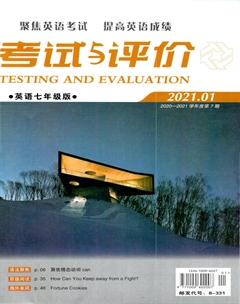Unit 2词语和句型考点归纳
任腊梅
1. dress
dress既可以用作名词,也可以用作动词。
(1) dress用作名词时,意为“连衣裙”。如:
I have an old green dress. 我有一件绿色的旧连衣裙。
(2) dress用作动词时,意为“穿衣服”。如:
The mother dresses her baby every morning. 这位妈妈每天早上给她的婴儿穿衣服。
The little girl cant dress herself. 这小女孩不会自己穿衣服。
【拓展】 (1) get dressed, 意为“穿上衣服”。如:
Tom always gets dressed at seven in the morning. 汤姆总是早上七点穿好衣服。
(2) be dressed in“穿着”,表示穿的状态。如:
She is dressed in a new skirt. 她穿着一条新短裙。
(3) dress up意为“装扮;乔装打扮”或者“穿上盛装;打扮”。如:
You neednt dress up for the party. 你不必为这个聚会精心打扮。
2. clean
clean既可以用作动词,也可以用作形容词。
(1) clean用作动词时,意为“打扫;弄干净”。如:
We clean our classroom every day. 我们每天打扫教室。
(2) 用作形容词时,意为“干净的”。如:
Her room is very clean. 她的房间非常干净。
3. early
early既可以用作副词,也可以用作形容词。其反义词是late。
(1) early用作副词时,意为“早”。如:
She gets up early. 她起床早。
(2) early用作形容词,意为“早的”。如:
We take the early bus every morning. 我们每天乘坐早班公共汽车。
4. exercise
exercise既可以用作动词,也可以用作名词。
(1) exercise用作动词时,意为“锻炼”。如:
My brother always exercises in the morning. 我弟弟总是在早晨锻炼。
(2) exercise用作名词时,意为“锻炼;练习”。常用搭配:take exercise 做运动;do morning exercises 做早操。如:
Please take exercise every day. 请每天进行锻炼。
Alice has lot of geography exercises to do. 爱丽丝有许多地理练习要做。
【温馨提示】 exercise指具体运动或体操时是可数名词,复数形式为exercises;泛指运动时是不可数名词。
5. best
best是形容词最高级形式,意为“最好的”,是形容词good和well的最高级。如:
I try to do my best each day. 每天我都尽力做到最好。
She is one of the best students in our class. 她是我们班最优秀的学生之一。
6. group
group用作名词,意为“组;群”,它是集合名词,作主语时,若作为一个整体看待,谓语动词用单数形式;若指具体的每个成员时,谓语动词用复数形式。如:
They tried to form a study group. 他们试着组建一个学习小组。
A group of girls are cleaning the classroom. 一群女孩正在打扫教室。
7. taste
taste可用作系动词,实义动词和名词。
(1) taste用作系动词时,意为“尝起来”,其后接形容词作表语。如:
The apple tastes sweet. 这个苹果尝起来很甜。
(2) taste用作实义动词时,意为“尝,品(味道)”,后接名词或代词作宾语。如:
Please taste this to see if you like it. 请尝尝这个,看看你喜不喜欢。
(3) taste用作名词时,意为“味道,滋味”。如:
This dish is to his taste. 这道菜合他的口味。
8. night
night用作名词,意为“夜晚;晚上”。如:
They stay two nights at the hotel. 他们在旅馆里住了两夜。
【拓展】 (1) at night表示泛指的“在夜晚”。night 前不加冠词,也没有其它修饰语,后面也不接短语或其它成分。如:
He often stays up at night. 他晚上经常熬夜。
(2) in the night表示“(不具体的)某个夜晚”;后面不接其它修饰语,night 前用定冠词the。侧重于表示一个时间段,相当于during the night。如:
Jack calls me three times in the night. 杰克在夜里給我打了三次电话。
9. either
(1) either用作副词时,意为“也”, 一般用于否定句中,置于句末,用逗号与句子其它成分隔开。如:
He doesnt come here, either. 他也没有来这儿。
If youre not going, Im not going, either. 你不去,我也不去。
(2) either用作连词,意为“或者”,常与or连用,构成either... or...结构,意为“要么……要么……;或者……或者……”。如:
He must be either mad or drunk. 他要么是疯了,要么是喝醉了。
It must be either this or that. 非此即彼。
【拓展】 带有too的肯定句变为否定句时,须将too改为either,反之亦然。如:
I have a sister, too. → I dont have a sister, either.
We arent fifteen, either. → We are fifteen, too.
【短语串串】
1. get up 起床;站起 2. brush ones teeth 刷牙 3. get dressed穿上衣服 4. have / eat breakfast 吃早餐 5. take a shower 洗澡6. radio station / show广播电台/节目 7. at night晚上 8. go to work去上班 9. be late for work上班迟到 10. do (ones) homework做作业 11. clean the room 打掃房间 12. take a walk散步;走一走 13. go home 回家 14. get home到家 15. lots of 大量;许多
【难句在线】
—What time do you usually eat dinner? 你通常什么时候吃晚饭?
—I usually eat dinner at a quarter to seven in the evening. 我通常在晚上六点四十五吃晚饭。
“What time...”表示对时间的提问,其同义句型还有“When...”如:
—What time do you usually get up? / When do you usually get up?你通常什么时候起床?
—I usually get up at six oclock in the morning. 我通常在早晨六点钟起床。

